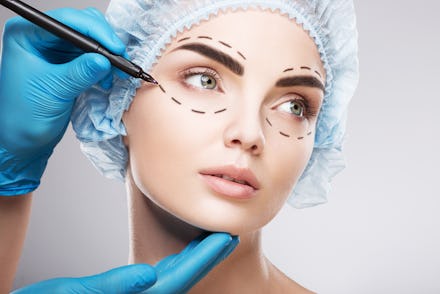Instagram is removing filters that mimic plastic surgery

A little nip here, a little tuck there, adjust the lighting...and voila, your latest selfie is Insta-ready. Thanks to a litany of AR filters, Instagram users can change their appearance every day, or every post, with upgraded makeup jobs, haloes of neon hearts, or even a digital experiment with lip fillers. Due to a new policy though, filters that mimic the effects of plastic surgery may soon be disappearing from Instagram.
The company behind Instagram's AR face filters, Spark AR, is planning to systematically remove filters that offer "digital" plastic surgery. Spark AR took to its official Facebook page with a detailed statement on Friday, October 18. It's unclear if creators received additional emails or notifications beyond this announcement just yet.
"We want Spark AR effects to be a positive experience and are re-evaluating our existing policies as they relate to well-being," the post reads. The team will be "removing all effects associated with plastic surgery from the Instagram Effect Gallery, postponing approval of new effects associated with plastic surgery until further notice, and continuing to remove policy-violating effects as they are identified."
"At this time, we're not able to provide exact timing on the new policy rollout, but we’ll share updates as soon as we can. We appreciate your patience as we work to maintain a healthy AR ecosystem for creators and our entire community!" the post stated. So while the platform will be removing filters, there's no timeframe on when they'll be disappearing or when creators should expect to see their filters approved or rejected for Instagram.
Filters that mimic the results of plastic surgery have appeared to be on the rise as of late, and include options like Teresa Fogolari's "Plastica" filter or even Silich Masha's "Bad Botox" filter, which has been used 100 million times. If Spark AR's statement is taken at face value, Daniel Mooney's "Fix Me" filter will almost certainly be on its way out, as it gives users bruising and markings related to actual process of plastic surgery, rather than just the results.
But other apps still offer additional, less dramatic (or less realistic) makeovers, and people can't get enough of them. Based on Spark AR's initial statement, it's unclear how explicitly "associated with plastic surgery" filters will have to be to be removed.
While many users of these filters would likely argue that it's all in good fun, it's possible that these types of filters may be furthering harmful ideas surrounding body image. In extreme cases, these apps could even contribute to body dysmorphia, a disorder where people fixate on "one or more perceived defects or flaws" in their appearance which is typically either perceived by others as a minor issue or not observable at all.
Spark AR initially launched in May 2018 to a limited amount of "approved creators," but as of August 2019 it opened the program up further so that anyone could put their own spin on the popular Instagram filters. But it appears that fledgling creators will have to put their ideas on hold for the time being. Efforts will be focused on clearing out the filters and effects that violate the new Spark AR policy, and it's unclear if there are additional categories of filters that will be phased out going forward following the new policy rollout.
Meanwhile, if these filters are important to you, you can still use Snapchat or manually edit your photos with Facetune. You just won't be able to mimic the specific appearance of plastic surgery in your IG story very much longer.